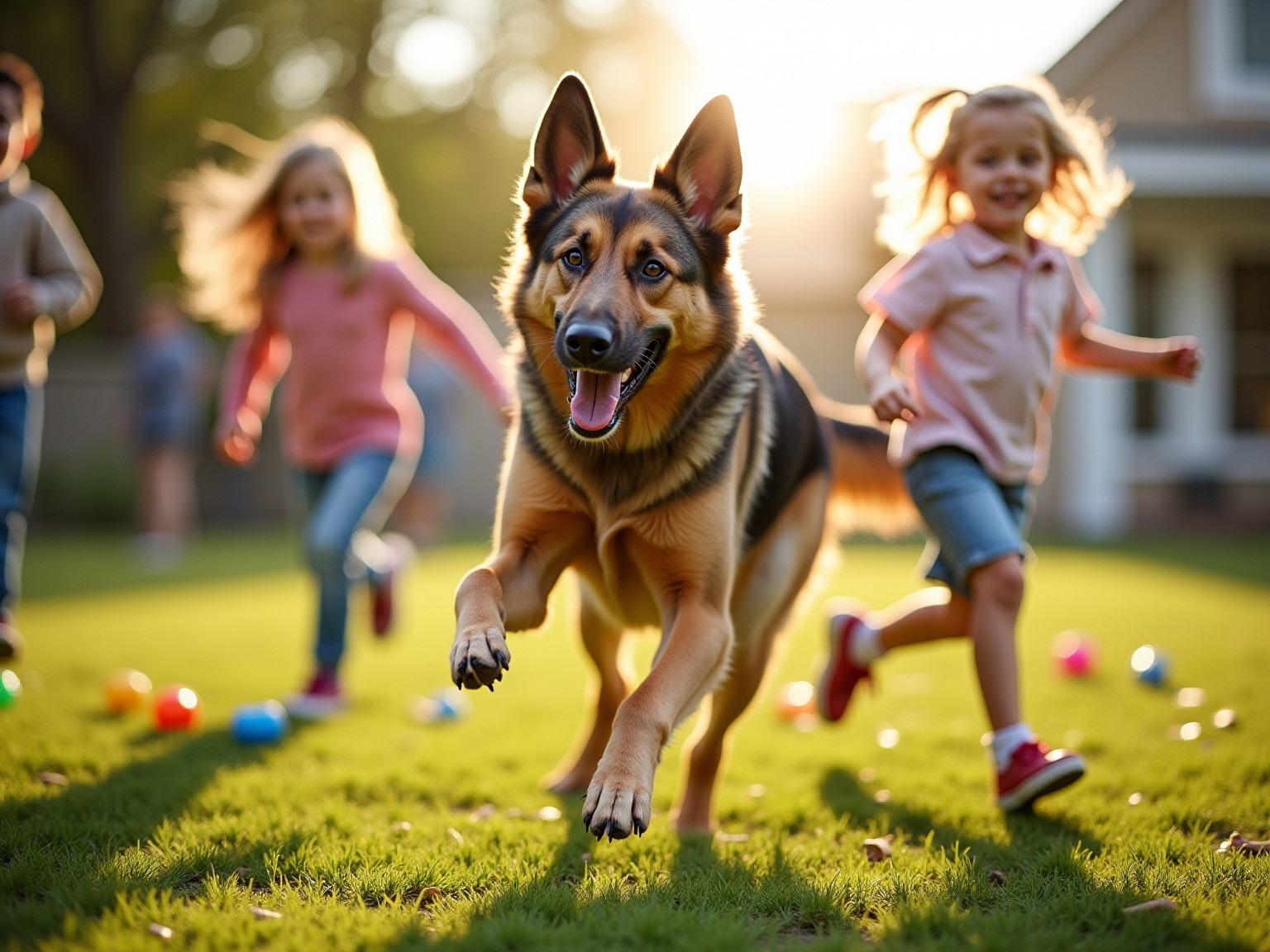3 Steps to Choose the Right Herding Dogs for Your Family
Overview
Choosing the right herding dogs for your family is an important decision that requires thoughtful consideration. It’s essential to understand their unique traits and how they align with your family’s lifestyle. By evaluating different breeds for compatibility, you can ensure a joyful addition to your home.
Herding dogs thrive in environments that offer high energy and mental stimulation. They need a nurturing atmosphere where they can flourish alongside your family dynamics. When you take the time to assess your living conditions, you pave the way for a harmonious relationship and fulfilling companionship with your furry family members.
At Adventure Den, we recognize the importance of these factors. We invite you to explore how our resources can support you in making the best choice for your beloved pets. Together, we can create a loving environment that meets the needs of both your family and your new companions.
Introduction
Welcoming a new dog into your family is an exciting journey, especially when considering a herding breed known for its intelligence, energy, and strong instincts. These remarkable dogs, historically bred to manage livestock, bring a unique set of traits that can significantly impact family dynamics.
Their high energy levels demand ample exercise, while their affectionate nature fosters deep emotional bonds. Understanding these characteristics is essential for potential owners like you. As you assess your lifestyle and needs, it’s important to evaluate the compatibility of various herding breeds to ensure a harmonious fit for your household.
This article delves into the essential traits of herding dogs, the lifestyle considerations before bringing one home, and how to choose the right breed for a joyful companionship with your furry family members.
Understand Herding Dog Traits and Temperament
Herding dogs are celebrated for their intelligence, high energy, and strong instincts—qualities that stem from their historical role in managing livestock. Understanding these traits is essential for families considering the addition of a working dog to their household. Here are some key traits to keep in mind:
- High Energy Levels: Herding dogs require substantial physical activity and mental stimulation, often needing at least two hours of exercise daily. Breeds like German Shepherds exemplify this need. Without adequate outlets for their energy, they may resort to destructive behaviors out of boredom.
- Intelligence: Renowned for their quick learning abilities, working types excel in obedience training. The intelligence of herding dogs calls for ongoing mental challenges to keep them engaged and to prevent behavioral issues. Recognizing and managing the instincts of herding dogs is crucial for fostering harmonious interactions within the household. Despite their work-oriented demeanor, many herding dogs are loyal and affectionate companions, flourishing in environments where their physical and emotional needs are met. As Jerome K. Jerome wisely observed, canines pay attention and show interest in their loved ones, highlighting their capacity for emotional bonding.
Real-life examples illustrate how these traits manifest in domestic settings. For instance, families with herding dogs often find their pets engaging playfully with children, showcasing both their energetic nature and loving disposition. Recent studies underscore the importance of understanding these behaviors, emphasizing that herding dogs need affection and attention just as much as they require exercise. The case study titled ‘The Need for Love in Canines’ reinforces this idea, asserting that recognizing their emotional needs is vital for their well-being. By familiarizing yourself with these characteristics, you can more effectively determine if a livestock dog is the right fit for your household and ensure a nurturing environment for your furry family members.
Assess Your Family’s Lifestyle and Needs
Before welcoming a working canine into your home, it’s important to thoughtfully assess several key aspects of your household’s lifestyle. These energetic herding dogs truly thrive in active environments. Research shows that dog ownership positively influences physical activity levels. Reflect on whether your household enjoys outdoor adventures, regular exercise, and playtime. If your lifestyle is more sedentary, herding dogs may not be the ideal match for your family.
- Time Commitment: Working dogs require consistent daily training, exercise, and social interaction. It’s crucial to evaluate if you can dedicate the necessary time to meet a working dog‘s needs, as they flourish with structured routines and engagement. For example, daily training sessions can range from 30 minutes to an hour, depending on the dog’s age and energy level.
- Space: Think about your living situation. Herding dogs, particularly cattle dogs, benefit from ample space to run and play, making homes with large yards or access to open areas especially suitable.
- Children and Other Pets: If you have young children or other pets, consider how a working dog’s natural instincts may interact with them. Proper training and supervision are essential to ensure safe and positive experiences. Many families with active lifestyles and working dogs report heartwarming stories when proper introductions and training are applied.
By carefully evaluating these factors and recognizing the importance of a nurturing environment that promotes walking and physical activity, you can make a more informed decision about whether your household is ready for the joys and responsibilities of owning a working dog.
Evaluate Different Herding Breeds for Compatibility
To effectively evaluate herding dogs for compatibility with your family, follow these essential steps:
- Research Breeds: Begin by exploring popular herding dogs like Border Collies, Australian Shepherds, and German Shepherds. Each breed showcases unique traits, energy levels, and maintenance needs that significantly influence household dynamics. For instance, Border Collies are renowned for their intelligence and high energy, making them ideal for active families. In contrast, Australian Shepherds are celebrated for their versatility and affectionate nature. Additionally, consider the Finnish Lapphund, known for its 12-15 year lifespan—a crucial factor for families looking for long-term companionship.
- Consider Size and Temperament: Take time to assess the size and temperament of each breed. Larger breeds often require more space and physical activity, which may not suit families living in smaller homes or apartments. On the other hand, herding dogs of smaller breeds can adapt more easily to confined spaces. Moreover, reflect on temperament; certain breeds are more patient and gentle, making them better suited for families with young children. Remember, dogs are not just machines responding to rewards; understanding their emotional and social needs is vital for a nurturing relationship.
- Consult Species-Specific Resources: Utilize trustworthy resources like the American Kennel Club or breed-specific clubs to gather comprehensive information about each breed’s needs, behaviors, and health considerations. Recent studies highlight the importance of understanding a breed’s traits to foster a harmonious family environment. For example, the case study titled ‘The Importance of Liberty in Dog Training’ emphasizes granting herding dogs the freedom to explore and engage with their surroundings, which is essential for their happiness and well-being.
- Meet Breeds in Person: Whenever possible, visit local shelters or breeders to interact with various herding breeds. Observing their behavior and engaging with them directly can provide invaluable insights into their compatibility with your family. This hands-on experience allows you to gauge their energy levels and social interactions, ensuring a better fit for your household. As one expert noted, evidence of social cognition indicates that dogs are not merely Pavlovian learning machines; they are sentient beings, which profoundly impacts the dog-human relationship.
By thoughtfully evaluating these aspects, you can confidently choose a herding breed that aligns with your family’s lifestyle, ensuring a joyful and fulfilling companionship for your furry family members.
Conclusion
Welcoming a herding dog into your family can be a truly rewarding experience, yet it requires thoughtful consideration of various factors. Understanding the unique traits of herding breeds—like their high energy levels, intelligence, strong instincts, and affectionate nature—is essential for potential owners. These characteristics not only influence the dog’s behavior but also play a significant role in how well they integrate into family life.
Before making this important commitment, it’s crucial to assess your family’s lifestyle and needs. Evaluating activity levels, time availability for training and exercise, living space, and the dynamics with children and other pets can help determine if a herding dog is the right fit for your home. A dog that thrives in an active environment needs a family that can provide the necessary engagement and care.
Finally, evaluating different herding breeds for compatibility ensures that the chosen dog aligns well with your family’s dynamics. Researching breed-specific traits, consulting reputable resources, and meeting potential pets in person can lead to a more harmonious relationship. By taking these thoughtful steps, families can make informed decisions that foster joyful companionship with their new furry family members, ultimately enriching their lives together.
Frequently Asked Questions
What are the key traits of herding dogs?
Herding dogs are known for their high energy levels, intelligence, and strong instincts, which are rooted in their historical role in managing livestock.
How much exercise do herding dogs need?
Herding dogs typically require at least two hours of physical activity and mental stimulation daily. Without sufficient exercise, they may develop destructive behaviors due to boredom.
Why is intelligence an important trait in herding dogs?
Herding dogs are renowned for their quick learning abilities and excel in obedience training. Their intelligence necessitates ongoing mental challenges to keep them engaged and prevent behavioral issues.
How do herding dogs interact with families?
Herding dogs are often loyal and affectionate companions, engaging playfully with children and showcasing both their energetic nature and loving disposition.
What emotional needs do herding dogs have?
Herding dogs require affection and attention in addition to exercise. Recognizing their emotional needs is vital for their well-being and fosters harmonious interactions within the household.
How can families determine if a herding dog is the right fit for them?
By familiarizing themselves with the traits and needs of herding dogs, families can better assess if a livestock dog matches their lifestyle and can ensure a nurturing environment for their pet.







